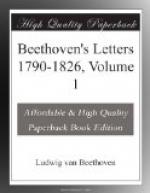125.
TO THE ARCHDUKE RUDOLPH.
1814.
I hope you forgive me for not having come to you. Your displeasure would be totally undeserved, and I will amply compensate for lost time in a few days. My Opera of “Fidelio"[1] is again to be performed, which gives me a great deal to do; moreover, though I look well, I am not so in reality. The arrangements for my second concert[2] are partly completed. I must write something new for Mdlle. Milder.[3] Meanwhile it is a consolation to me to hear that Y.R.H. is so much better. I hope I am not too sanguine in thinking that I shall soon be able to contribute towards this. I have taken the liberty to apprise my Lord Falstaff[4] that he is ere long to have the honor of appearing before Y.R.H.
[K.]
[Footnote 1: Letters 125 and 126 refer to the revival of the Opera of Fidelio, which had not been given since 1806, and was not again produced on the stage till the 23d May, 1814, in the Kaernthnerthor Theatre. Beethoven’s benefit took place on the 8th July, two newly composed pieces being inserted.]
[Footnote 2: Beethoven gave a concert on the 2d January, 1814, when Wellington’s Victory was performed, and on the 26th March another for the benefit of the Theatrical Fund, at which the Overture to Egmont and Wellingtons’s Victory were given, directed by Beethoven himself.]
[Footnote 3: Anna Milder, Royal Court opera singer, a pupil of Vogl’s, who first sang the part of Leonore in Fidelio.]
[Footnote 4: By “my Lord Falstaff” he means the corpulent violinist Schuppanzigh.]
126.
TO THE ARCHDUKE RUDOLPH.
Vienna, July 14, 1814.
Whenever I inquire about you I hear nothing but good news. As for my own insignificant self, I have been hitherto hopelessly detained in Vienna, and unable to approach Y.R.H.; I am also thus deprived of the enjoyment of beautiful Nature, so dear to me. The directors of the theatre are so conscientious, that, contrary to their faithful promise, they have again given my Opera of “Fidelio,” without thinking of giving me any share in the receipts. They would have exhibited the same commendable good faith a second time, had I not been on the watch like a French custom-house officer of other days. At last, after a great many troublesome discussions, it was settled that the Opera of “Fidelio” should be given on Monday the 18th of July, for my benefit. These receipts at this season of the year may more properly be called deceits; but if a work is in any degree successful it often becomes a little feast for the author. To this feast the master invites his illustrious pupil, and hopes—yes! I hope that Y.R.H. will graciously consent to come, and thus add lustre to everything by your presence. It would be a great boon if Y.R.H. would endeavor to persuade the other members of the Imperial family to be present at the




